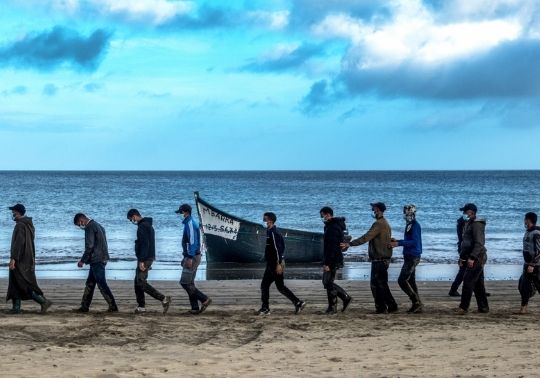
The Tarongers Campus is hosting an impressive exhibition, on its explanade in front of the libraby, by the Pulitzer Prize-winning photojournalist Javier Bauluz on the sub-Saharan immigrants who try to reach Europe via the so-called Canary Islands route. The exhibition, organised by the Human Rights Institute of the Universitat de València (IDH-UV), can be contemplated until December 23th.
The exhibition brings together fifty photographs that Javier Bauluz took over a five-month period. They are just a small sample of the extensive documentation work that the photojournalist has done on this human drama. A hundred of them are also gathered in Bauluz's book "#La Ruta Canaria Más allá del muelle" which has been presented at the Faculty of Law in the framework of the Human Rights Week, organised by the IDH-UV.
More than two thousand people disembarked during the weekend of November 7th 2020 in the Canary Islands, recalls El País journalist María Martín in the book. In the Arguineguín dock, there were already more than a thousand people lying on the asphalt. In the following weeks, 23,000 were reached. However, that record was anything but unpredictable. Following Morocco's strengthening of border closures and the extreme cruelty to migrants in a stateless Libya, the Canary Islands route, despite its dangerousness, became the alternative that many opted for in an attempt to escape misery. “Migration is like water, claims Bauluz, if you close off one path, it will always find another way out". When a route is closed, he adds, "it only leads to more suffering and death, people will keep trying more dangerous routes”.
At the presentation of the book, professor Ángeles Solanes pointed out that “none of his photographs leave anyone indifferent because they portray the harshness and inhumanity of migration". For his part, professor Javier de Lucas defended photojournalism and its documentary function in order to confront the perilous slippage denounced by Javier Bauluz. A slippage that goes from indifference and lack of empathy to hatred. “The breach of the rule of law can be perceived by looking at these photographs”, pointed out Lucas, who said that, despite his status as a socialist senator, he was not blind and that “our immigration law sow seeds of hatred”. “This immigration and asylum policy is a rift in the rule of law”, he concluded.
The book also includes an article by Nicolas Castellano on the twenty-five years of Javier Bauluz’s professional career on the borders documenting migration.
About the IDH-UV
Founded in 2005, the purpose of the IDH-UV is to disseminate the values inherent to human rights; to create a framework for discussion and dialogue on human rights; to develop research on human rights; to promote the dissemination of scientific works on human rights; and to encourage human rights education. In 2008, the Human Rights Institute of the Universitat de València received a grant under the Consolider-Ingenio 2010 programme. The Institute is part of a project involving twelve research groups from different Spanish universities, coordinated by the Bartolomé de las Casas Human Rights Institute of the University Carlos III of Madrid. It was the first time that a group of researchers from the legal field received such a grant, mostly aimed at scientific contexts away from Humanities and Social Sciences.
Links:
















